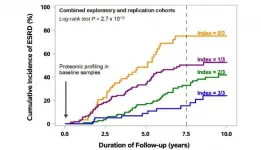Study suggests it is common for pet dogs and cats to catch COVID-19 from their owners
2021-07-01
(Press-News.org) COVID-19 is common in pet cats and dogs whose owners have the virus, according to new research being presented at the European Congress of Clinical Microbiology & Infectious Diseases (ECCMID) held online this year.
Cases of owners spreading the disease to their dog or cat have been documented before but are considered to be of negligible risk to public health. However, as vaccination and other measures reduce human-to-human transmission of the virus, it is becoming imperative that we understand more about the potential risk posed by animal infections.
To find out more, Dr Els Broens and colleagues at Utrecht University, Utrecht, the Netherlands, studied dogs and cats of people who had tested positive for COVID-19. A mobile veterinary clinic visited the homes of owners who had tested positive in the past two to 200 days and oropharyngeal and rectal swabs and blood samples were taken from their cats and dogs.
The swabs were used in PCR tests, which provide evidence of current infection, and the blood samples were tested for antibodies, which provide evidence of past infection.
Some 156 dogs and 154 cats from 196 households were tested in total. Six cats and seven dogs (4.2%) had positive PCR tests and 31 cats and 23 dogs (17.4%) tested positive for antibodies.
Eleven of the 13 owners whose pets had positive PCR tests agreed for them to undergo a second round of testing one to three weeks after they were first tested. All 11 animals tested positive for antibodies, confirming they had had COVID-19. Three cats still had positive PCR tests and were tested for a third time. Eventually, all PCR-positive animals cleared the infection and became PCR negative.
Eight cats and dogs that lived in the same homes as the PCR-positive pets were also tested again at this second stage to check for virus transmission among pets. None tested positive, suggesting the virus wasn't being passed between pets living in close contact with one another.
With pets in 40/196 households (20.4%) having antibodies for the virus, the study reveals that COVID-19 is highly prevalent in pets of people who have had the disease.
The researchers say that with other studies showing COVID-19 rates to be higher in pets that have been in contact with people with the virus, than in pets without such contact, the most likely route of transmission is from human to pet, rather than the other way round.
Dr Broens adds: "If you have COVID-19, you should avoid contact with your cat or dog, just as you would do with other people.
"The main concern, however, is not the animals' health - they had no or mild symptoms of COVID-19 - but the potential risk that pets could act as a reservoir of the virus and reintroduce it into the human population.
"Fortunately, to date no pet-to-human transmission has been reported. So, despite the rather high prevalence among pets from COVID-19 positive households in this study, it seems unlikely that pets play a role in the pandemic."
INFORMATION:
ELSE PRESS RELEASES FROM THIS DATE:
2021-07-01
**Note this is a special early release from the European Congress of Clinical Microbiology & Infectious Diseases (ECCMID 2021). Please credit the conference if you use this story**
New research being presented at the European Congress of Clinical Microbiology & Infectious Diseases (ECCMID), held online this year, suggests that people with COVID-19 frequently pass it on to their pets. Cats that sleep on their owner's bed seem to be at particular risk of infection.
Previous studies have shown that cats and dogs can catch COVID-19 from their owners but it wasn't clear how susceptible they were and what, if anything, increased their odds of becoming infected. Answering these questions is important from both a public health and animal ...
2021-07-01
Individuals who contract COVID-19 even after vaccination are likely to have a lower viral load, experience a shorter infection time and have milder symptoms than people who are unvaccinated, according to research that includes data from ongoing University of Arizona Health Sciences studies.
"If you get vaccinated, about 90% of the time you're not going to get COVID-19," said Jeff Burgess, MD, MS, MPH, associate dean for research and professor at the Mel and Enid Zuckerman College of Public Health and principal investigator of the Arizona Healthcare, ...
2021-06-30
MINNEAPOLIS - Finding treatments for advanced multiple sclerosis (MS) has been difficult. But new research may help neurologists identify which drugs are best for people with the advanced form of MS called secondary progressive MS. The new study, published in the June 30, 2021, online issue of Neurology®, the medical journal of the American Academy of Neurology, found that the more potent disease-modifying drugs are more effective in reducing flare-ups in secondary progressive MS than the less potent drugs that tend to be safer to take. However, the researchers found no difference in how fast the disease progressed between these two types of drugs.
Most ...
2021-06-30
MINNEAPOLIS - A new study suggests that even when differences in socioeconomic status are taken into consideration, Black people with multiple sclerosis (MS) may be more negatively impacted by the disease than white people with MS. The research is published in the June 30, 2021, online issue of Neurology®, the medical journal of the American Academy of Neurology. The study found that Black people with MS had lower scores on certain measures of neurological health, like dexterity and walking tests and showed more evidence of disease progression on brain scans.
"While lower socioeconomic status appears to be linked to doing worse on tests ...
2021-06-30
June 30, 2021 - For most patients, the reasons for having a facelift are simple: to "turn back the clock" for a younger and more attractive appearance. Even during the pandemic year 2020, more than 234,000 patients underwent facelift surgery, according to American Society of Plastic Surgeons (ASPS) statistics.
When considering facelift surgery, patients may ask, "How much younger will I look?" For plastic surgeons, that has been a difficult question to answer. Typically, the cosmetic outcomes of facelifting have been judged on a case-by-case basis, or with the use of subjective ratings.
Now research suggests a new, objective approach to assessing the reduction in apparent age after facelift surgery: artificial intelligence (AI) networks trained to estimate age based on facial ...
2021-06-30
Electron motion in atoms and molecules is of fundamental importance to many physical, biological, and chemical processes. Exploring electron dynamics within atoms and molecules is essential for understanding and manipulating these phenomena. Pump-probe spectroscopy is the conventional technique. The 1999 Nobel Prize in Chemistry provides a well-known example wherein femtosecond pumped laser pulses served to probe the atomic motion involved in chemical reactions. However, because the timescale of electron motion within atoms and molecules is on the order of attoseconds (10-18 seconds) rather than femtoseconds (10-15 seconds), attosecond pulses are required to probe electron motion. With the development of ...
2021-06-30
A recent University of Arizona College of Pharmacy study suggests that Objective Structured Clinical Examinations (OSCEs) may be a valuable means of assesing clinical skills while providing learning experiences for pharmacy students in community pharmacy settings. While the OSCEs were designed to assess health care professionals in a clinical setting, there was limited data on its use in testing skills required in community pharmacies, until now.
For pharmacists working in retail, guiding patients on the use of over-the-counter (OTC) drugs is a common part of the job. According to a recent survey from the American ...
2021-06-30
Directing a meeting, dialing up an old acquaintance, dictating the perfect tuna salad sandwich across a drive-through window. For business and for pleasure, human beings are in constant communication.Our proclivity for socialization is lifelong, equally prominent in the lives of adolescents and adults. A recent study determined key differences in the ways that various age groups communicate, as well as one conversational component that stands the test of time: friendship. Specifically, bonds between individuals who identify as female.
Led by former Beckman Institute postdoctoral researchers Michelle Rodrigues and Si On Yoon, an interdisciplinary team evaluated how interlocutors' age and familiarity with one another impacts a conversation, reviewing the interaction's ...
2021-06-30
Elevated levels of three specific circulating proteins are associated with protection against kidney failure in diabetes, according to research from the Joslin Diabetes Center that will be published 30th June in Science Translational Medicine.
"As well as acting as biomarkers for advancing kidney disease risk in diabetes, the proteins may also serve as the basis for future therapies against progression to the most serious types of kidney disease," said Andrzej S. Krolewski MD, PhD, senior author on the publication, senior investigator at Joslin Diabetes Center and professor of medicine ...
2021-06-30
A 7- to 15-year longitudinal study of 358 diabetics has linked 3 proteins in blood with a slower progression of diabetic kidney disease and progressive kidney failure. The results from Zaipul Md Dom and colleagues suggest that the proteins could help researchers identify diabetics most at risk of kidney damage, potentially enabling earlier interventions and treatment. Despite advancements in blood sugar control and kidney therapies, patients with type 1 or type 2 diabetes still face a high risk of diabetic kidney disease. This condition can eventually progress to end-stage kidney disease, but some patients show slower kidney decline than others. In recent ...
LAST 30 PRESS RELEASES:
[Press-News.org] Study suggests it is common for pet dogs and cats to catch COVID-19 from their owners


